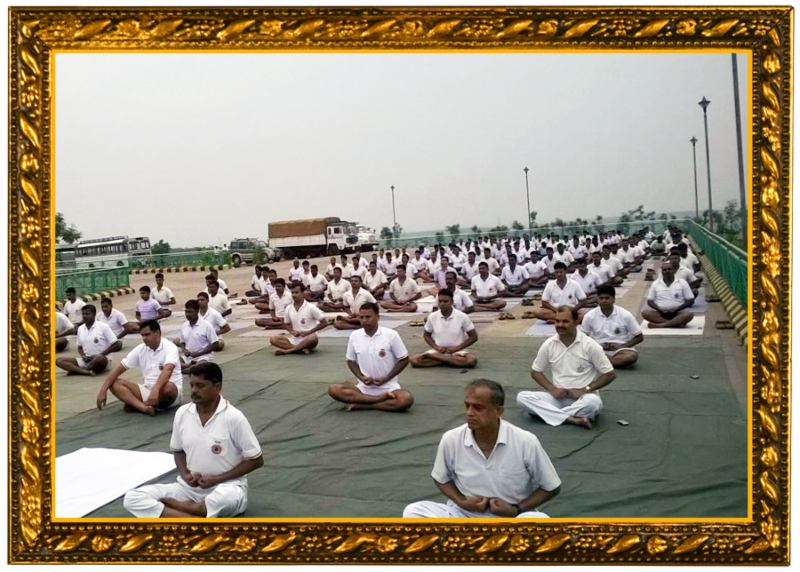|
|
JKYog e-Magazine, Issue No. 68
April, 2015
|
|
|
 |
 |
Surrender - The Way to Attain Eternal Bliss
It is stated in the Srimad Bhagvatam:
athāpi te deva padāmbujadvaya prasādaleśhānugṛihīta eva hi (10.14.29)
"No one can know God even if he endeavours to know Him for
innumerable lifetimes, but when God imparts His Grace to a soul, he can
know Him and attain Divine Bliss for eternity."
Not only the
Bhagvatam, but all the Scriptures declare in unison that we can neither
be eternally free from sorrow and suffering nor can we attain divine
bliss without God's grace. God's grace is a vital ingredient for
success on the spiritual path.
So how can we receive God's
grace? After all, innumerable Saints in the past have received
God's grace and crossed over the ocean of material misery. And
then there are souls like us who have remained bereft of God's grace
until now. There must be a secret to receiving God's grace which
we have not understood yet, because God is certainly not impartial or
unfair. He governs the world in a perfect and just manner.
 Shree Krishna reveals that secret in the Bhagavad Gita, He says: Shree Krishna reveals that secret in the Bhagavad Gita, He says:
tameva śharaṇaṁ gachchha sarvabhāvena bhārata (Chapter 18, Verse 62)
"Surrender
exclusively unto Him with your whole being, O Bharat. By his grace, you
will attain perfect peace and the eternal abode."
God's law is very simple, those who surrender to Him, receive His grace .
Truly
speaking, surrender is not an act of doing something in order to attain
God's grace; rather it is coming to a state of doing nothing. As
long as we suffer from the ego of being the doers, we remain bound by
the fruits of our actions because we are considered the doers of our
actions. The moment the feeling of doer-ship ends, we become
'non-doers' and God personally takes care of all our needs and protects
whatever we have for eternity.
Therefore, to attain divine bliss
of God, we will have to surrender this pride of doer-ship to Him just as
we surrendered to our mothers as newly born children. By
doing so, we will become non-doers and God will become the performer of
our every action. This is how He bestows His grace.Now, what can we surrender to God? We have body, senses, mind, and intellect. Which one of these should we offer to God?
Jagadguru
Shree Kripaluji Maharaj says that since mind alone is the cause of
bondage and liberation, it is the mind which should be surrendered to
God. The law in the spiritual realm is that only the attachment of
the mind determines the fruits of our actions. If we keep the
mind attached to the world and engage in devotion with the body, it will
only lead to worldly results. Whereas if our mind is surrendered
to God and we engage in devotion with the mind and perform worldly
activities with the body, we will reap spiritual results. The
surrender of the mind is true surrender.
|
 |
|
|
|
Truly speaking, surrender is not an act of doing something in
order to attain God's grace; rather it is coming to a state of doing
nothing. As long as we suffer from the ego of being the doers, we
remain bound by the fruits of our actions because we are considered the
doers of our actions. The moment the feeling of doer-ship ends, we
become 'non-doers' and God personally takes care of all our needs and
protects whatever we have for eternity.
|
|
|
 |
 |
Six Aspects of Surrender to God
Surrender
has been defined in the Hari Bhakti Vilas, Bhakti Rasāmṛita Sindhu, the
Vāyu Purāṇa and the Ahirbudhni Saṁhitā in the following manner:
ānukoolyasya saṅkalpaḥ, pratikulyasya varjanam, rakṣhiṣhyatīti viśhvāso goptṛitve varaṇaṁ tathā ātma nikśhepa kārpaṇye ṣhaḍvidhā śharaṇāgatiḥ
The above verse explains the six aspects of surrender to God:
|  |
To
desire only in accordance with the desire of God. By nature, we
are his servants, and the duty of a servant is to fulfil the desire of
the master. So as surrendered devotees of God, we must make our
will conform to the will of God.
A dry leaf is
surrendered to the wind. It does not complain whether the wind
lifts it up, takes it forward or backward, or drops it to the
ground. Similarly, we too must learn to be happy in the happiness
of God.
|  |
Not to desire against
the desire of God. Whatever we get in life is a result of our past
and present karmas. However, the fruits of the karmas do not come
by themselves. God notes them and gives the results at the
appropriate time. Since the results are dispensed by God himself,
we must learn to serenely accept them.
Usually, when people
get wealth, fame, pleasure, and luxuries in the world, they forget to
thank God. However, if they get suffering, they blame God for it,
"Why did God do this to me?" The second aspect of surrender means
to not complain about whatever God gives us.
|  |
To
have firm faith that God is protecting us. God is the eternal
father. He is taking care of all the living beings in
creation. There are trillions of ants on the planet earth, and all
of them need to eat regularly. Do you ever find that a few
thousand ants in your garden have died of starvation? God ensures
that they are all provided for. On the other hand, elephants eat
mounds of food every day. God provides for them too. Even a
worldly father cares and provides for his children. Why then
should we doubt whether our eternal father, God, will take care of us or
not? To have firm faith in his protection is the third aspect of
surrender.
|  |
To keep an attitude of
gratitude toward God. We have received so many priceless
gifts from the Lord. The earth that we walk upon, the sunlight
with which we see, the air that we breathe and the water that we drink,
are all given to us by God. In fact, it is because of Him that we
exist; He has brought us to life and imparted consciousness in our
soul. We are not paying Him any tax in return, but we must at
least feel deeply indebted for all that He has given to us. This
is the sentiment of gratitude.
The reverse of this is
the sentiment of ungratefulness. For example, a father does so
much for his child. The child is told to be grateful to his father
for this. But the child responds, "Why should I be
grateful? His father took care of him and he is taking care of
me." This is ingratitude toward the worldly father. To be
grateful toward God, our eternal Father, for all that He has given to
us, is the fourth aspect of surrender.
|  |
To see everything we
possess as belonging to God. This entire world has been created by
God. It existed even before we were born, and will continue to
exist even after we die. Hence, the true owner of everything is
God alone. When we think something belongs to us, we forget the
proprietorship of God.
Let us say that someone comes into your house when you are not at
home. He wears your clothes, eats out of your refrigerator, and
sleeps on your bed. On returning, you ask indignantly, "What have
you been doing in my house?"
He says, "I have not damaged anything. I have merely used everything properly. Why are you getting annoyed?"
You reply, "You may not have destroyed anything, but it all belongs
to me. If you use it without my permission, you are a
thief."
Similarly, this world and everything in it, belongs to God.
To remember this, and give up our sense of proprietorship is the fifth
aspect of Surrender.
|  |
To
give up the pride of having surrendered. If we become proud of
the good deeds that we have done, the pride dirties our heart and undoes
the good. That is why it is important to keep an attitude of
humbleness: "If I was able to do something nice, it was only because God
inspired my intellect in the right direction. Left to myself, I
would never have been able to do it." To keep such an attitude of
humility is the sixth aspect of surrender.
| | If
we can perfect these six points of surrender in ourselves, we will
fulfill God's condition and he will bestow his grace upon us.
|
 |
|
|
Yoga, Meditation and Lecture Programs
Swamiji
conducted yoga, meditation classes and also delivered enlightening
discourses at Fort Lauderdale, Maryland, Jacksonville, Tampa cities. See pictures
Are You Driven by the Mind or the Intellect?
Listen
to this short message from Swamiji's program on "Life Transformation
Series- The Art of Mind Management." This lecture series is having
amazing response. People love it, love it, love it!!! Don't miss
this!
Click here to watch
2-day Yoga and Meditation camp at NDRF Samarpan-Jagadguru
Kripalu Yoga and Naturopathy Hospital conducted a 2-day Yoga and
Meditation camp for National Disaster Response Force (NDRF) in Mundali,
Odisha on 15th &16th April. Nearly 200 cadets from the forces
participated in the camp. See pictures
|  |
|
|
 |
 |
|

|
|
Apr 25th to May 1st
|
|
May 9th to 15th
|
LA, CA
| |
May 2nd to 8th
|
San Jose, CA
|
May 16th to 21st
|
Phoenix, AZ
|
Up-coming Retreats 2015
|
May 23rd to 25th
|
Fresno, CA
|
Sept 5th to 7th
|
Dallas, TX
| |
July 10th to 12th
|
Mount Laurel, NJ
| |
For details, click here
|
 |
 |
|
|
Rules of Devotion
by Jagadguru Shree Kripaluji Maharaj
The
mind is to be engrossed in God, withdrawing it from worldly
affairs. This can be done only by gradual and continuous
practice.
|
|
The
mind is to be engrossed in God, withdrawing it from worldly
affairs. This can be done only by gradual and continuous
practice. The more the mind gets engrossed in God, the more it
becomes detached from the world. Detachment of the mind from the
world means that the mind is in the process of becoming attached to
God. The process of withdrawing the mind from the world is known
as vairagya, and the process of attaching the mind to God is known as abhyas. One needs to concentrate on these two processes simultaneously.
abhyāsavairāgyābhyāṁ tannirodhaḥ (Yogadarshan)
abhyāsena tu kaunteya vairāgyeṇa cha gṛiyate (Gita 6.35)
You have to perform it
practically. You all hear this from your Guru or other spiritual
preachers in your daily life. You say, "It is because you are so
short of time and there are so many worldly distractions." Whatever time
you devote to your devotional practice of withdrawing your mind from
this world, the mind again plays its trick by convincing you to stop
your practice time and again. In so doing, your effort does
not succeed in producing any beneficial results. So, train your
mind for two processes - withdrawing it from worldly affairs and
attaching it to God.
When you only fill
your mind with divine matter: God's names, forms, pastimes, glories,
abodes, and associates, it will be purified. If you fill it with
worldly things, it will get harmed. Loud chanting of the names of
God while simultaneously withdrawing the mind from worldly affairs saves
your mind from this pollution. When you speak you have to think
in your mind first; you cannot perform any action without the help of
the mind, and this puts strain on the mind. When you abstain from
speaking and performing any action, your mind remains unengaged.
Developing humility and practicing roopdhyan
are the two most important points to be kept in your mind. Be
more humble than a blade of grass. Have a feeling of forbearance
like that of a tree. Give respect to all without desiring any in
return. Do not nurture any ill feeling towards anyone, even in
your dreams. Do not find faults in others, but within.
Roopdhyan is a must in our devotional practice. The absorption of the mind in the loving remembrance of God's form is called roopdhyan.
You should constantly think, "God and the Guru are my All-in-All, and
are always with me everywhere as my eternal protectors."
Generally,
those who practice meditation, feel the presence of God with them, only
while they are engaged in devotional practice, but they totally forget
him thereafter. This kind of devotional practice is not correct,
because there is no point in earning ten rupees and losing it within few
minutes. Just as we are always conscious of the 'I', we should
become conscious that God is with us, always and everywhere.
|
|
 |
|

|
JKYog Presents
Bal-Mukund
Personality Development Classes for Children
|
|
Highlights:
· Character Building Values
· Yoga & Meditations
· Bhajans, Shlokas & Prayers
· Inspiring Stories
|
Showcase:
Bal-Mukund
welcomes all contributions of creative works from
children in different areas including poetry, moral
stories, art work, etc.
|
|
|
|
|
|
|
Every
month, Bal-Mukunds are introduced to a KRIPALU value that helps them
focus upon, and imbibe the highest values. LOVE is the value for the
month of April! Bal-Mukunds are being introduced to the various aspects
of this most beautiful and universally revered core value. The focus at
Bal-Mukund centers will be to teach the children about how divine and
selfless love can triumph over all, and fill the heart of one who
practices it with boundless joy and peace. They are encouraged to
appreciate that LOVE triggers, enables, and stimulates the growth of our
other core values.
Inspirational
Stories for Children, Vol. 1, has 4 motivating stories that are the
engaging basis for this value to be introduced. The stories of
'Gajendra', 'King Ambarish', 'Rantidev' and 'Dhruv' are taught to
the children, followed by the appealing age-specific worksheets that
help them review concepts and related details. From answering story
based questions, to solving riddles, unscrambling words, playing
crosswords, and coloring, Bal-Mukunds are enjoying creative ways of
appreciating and living LOVE!
Bal-Mukund Makes Learning Fun! It Engages the Heart and the Mind! For all related queries email info@bal-mukund.org
|
| |
|
|
|
|
 |
|
| 
Preparation Time:
11-15 minutes
Cooking time:
16-20 minutes
Servings:
4 people
Ingredients:
Gram flour (besan) 2 cups
Green cardamom powder 1/2 teaspoon
Pistachios Chopped -12 Almonds sliced 10-12
Powdered sugar 1 cup
Pure ghee 1 cup + for greasing
|
Method
Step 1: Heat the ghee in a
non-stick kadai; add the gram flour and sauté on low heat, stirring
continuously, for ten to fifteen minutes, or till it starts changing
colour and is fragrant.
Step 2: Add the cardamom powder and pistachio
and almond slivers, and mix. Remove from the heat and set aside to cool
for 5 minutes.
Step 3: Add the powdered sugar and mix well.
Step
4: Grease a six-by-eight-inch aluminium straight-sided shallow tray
with the ghee. Pour the gram flour mixture into the tray and spread it
evenly with a greased spatula.
Step 5: Cool and cut into squares or
diamonds and serve. Store the burfi in an airtight container.
Enjoy this delicious burfi every bite.
|
 |
|
Contact us
|
The Editor JKYog: XVII/3305, 1st Floor, Ranjit Nagar
(Near PUSA), New Delhi - 110008, India
|
7405 Stoney Point Dr, Plano
TX 75025, USA
|
|
|
|
|
|